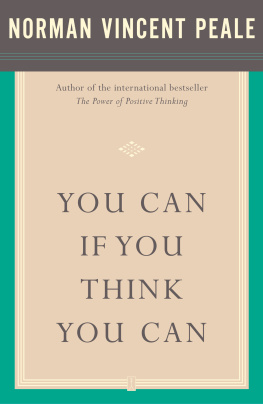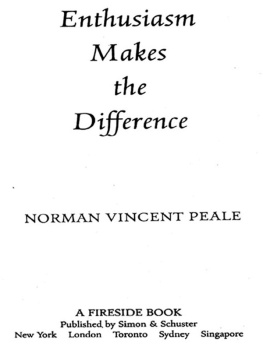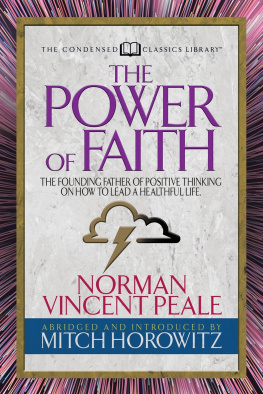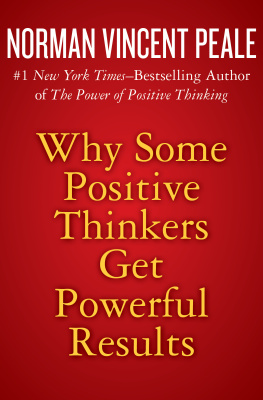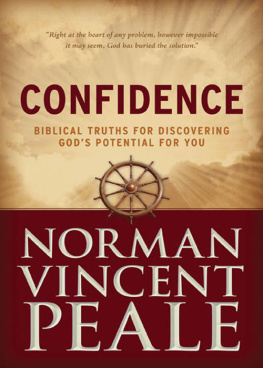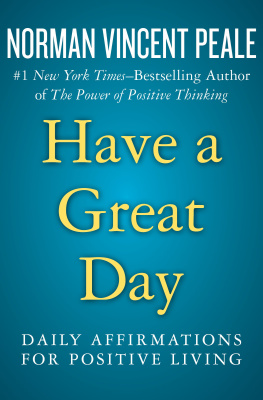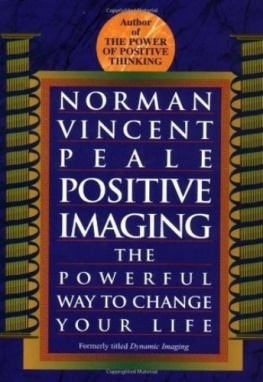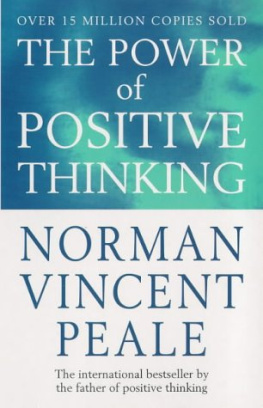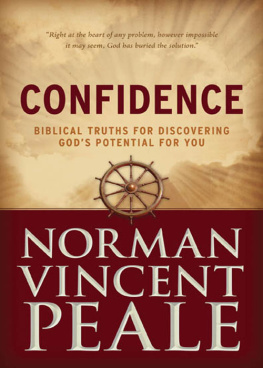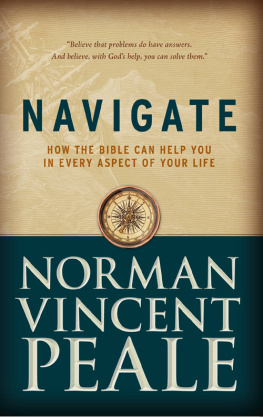CONTENTS
One
THE PERSISTENCE PRINCIPLE: ITS ALWAYS TOO SOON TO QUIT
Two
SO WHATS YOUR PROBLEM? YOU CAN HANDLE IT
Three
UPTIGHT? TENSE? HOW TO COOL IT AND RELAX
Four
MOTIVATION THAT REALLY MOTIVATES
Five
KEEP ON BELIEVING IN YOURSELFHAVE CONFIDENCE
Six
YOU CAN IF YOU THINK YOU CAN
Seven
WHAT ARE YOU AFRAID OF? FORGET IT!
Eight
EXPECT A MIRACLEMAKE MIRACLES HAPPEN
Nine
BORED? FRUSTRATED? FED UP? WHAT TO DO ABOUT IT
Ten
NEVER THINK OF FAILINGYOU DONT NEED TO
Eleven
ALL THE RESOURCES YOU NEED ARE IN YOUR MIND
Twelve
WAYS TO FOSTER HEALTH, VITALITY, ALIVENESS
Thirteen
EASE UP! HAVE A SENSE OF HUMOR
Fourteen
GET ON TOP OF THINGS AND STAY THERE
Dedicated to
RUTH STAFFORD PEALE
my beloved wife
and
constant partner
in all our many activities
with love and gratitude

A special word of appreciation to my secretaries, Miss Grace M. Blythe, for her splendid assistance in the preparation of this manuscript, and Mrs. Alice Olivet, for her helpfulness in research.
ACKNOWLEDGMENTS
Permission to reprint excerpts is gratefully acknowledged: Guideposts Associates, Inc., to quote from Guideposts Magazine, copyright by Guideposts Associates, Inc., Carmel, New York 10512: Back from Happy Town, copyright 1968; I Fought the River for My Child, copyright 1961; What the Mountain Did to Me, copyright 1972. Curtis Brown Ltd., Why Some Men Live Longer by Mary McSherry with Frederick J. Stare, M.D., published in Womans Day Magazine, copyright 1971 by Fawcett Publications, Inc. Success Unlimited, 6355 Broadway, Chicago, Illinois 60660, copyright 1973, Six Secrets to Double Your Idea Power from the April 1973 issue. Pantheon Books, a Division of Random House, Inc., The Wild Wheel, by Garet Garrett, copyright 1952. Science of Mind Magazine, February 1971, article by Dr. Krimsky, A Doctor Looks at Religion. The National Observer, copyright Dow Jones & Company, 1972, The Boredom Epidemic, by Peter T. Chew.
Also excerpted: Two Words to Avoid, Two to Remember, copyright 1967 by the Readers Digest Association, Inc. Michigans Giant Stride, The Story of the Mackinac Bridge, by Walker L. Cisler, copyright 1967. Printed for the Newcomen Society in North America by Princeton University Press.
Thank you for purchasing this Touchstone eBook.
Sign up for our newsletter and receive special offers, access to bonus content, and info on the latest new releases and other great eBooks from Touchstone and Simon & Schuster.
C LICK H ERE T O S IGN U P
or visit us online to sign up at
eBookNews.SimonandSchuster.com
We hope you enjoyed reading this Touchstone eBook.
Sign up for our newsletter and receive special offers, access to bonus content, and info on the latest new releases and other great eBooks from Touchstone and Simon & Schuster.
C LICK H ERE T O S IGN U P
or visit us online to sign up at
eBookNews.SimonandSchuster.com

Dear Reader
If you are an old friend, welcome to another book. If you are a new friend, welcome to you, too. One of the chief delights in life is to keep old friends and make new ones.
But why another book when we have already written seventeen and collaborated on others? Well, perhaps it is strange, but one seems to keep on feeling that he has something more to say, or that he would like to repeat in a different way some things he has already said, or perhaps he hopefully wants to express in a more persuasive manner those principles which he knows to be effective.
A long time ago I developed what might be called an obsession. The obsession is to try to help people get the best from life and learn how to live with its hard experiences in a creative manner.
Personally, I have always been fascinated by the tremendous qualities in the individual and by the amazing things human beings can do with themselves. To me this is so exciting, so fabulous, that I just cannot help coming forward once again with more inspiring stories of turned-on people who have really done something remarkable, especially in releasing their own potential. And these are stories of the plain people, just like ourselves. At least, like me.
Having known many men and women and having had opportunity to watch them overcome problems and come up with real values, I have become aware that certain specific principles are always involved in creative outcomes. This book is written to outline those dynamic and workable principles and to encourage my readers to put them into operation for themselves. Its purpose is to persuade you, the reader, that you can if you think you can.
This book is produced out of an enthusiastic belief in people and a desire to encourage them to take charge of their lives by fully realizing the amazing possibilities inherent in the mind.
If you are not experiencing the best and most exciting values, this book is designed to offer workable suggestions for reaching your objectives. If difficulties and problems are ganging up on you and your confidence is shaky, it is hoped that this book may make you realize that you can indeed handle whatever comes and handle it well. Practical suggestions are offered that can help you as they have helped others.
After you have read this book, if your belief in the powers of your own mind is enhanced, if you have a more workable thought pattern, and if you know for a fact that you can successfully deal with any problem, I shall feel that my sincere purpose in writing it has been achieved.
Of course I believe in everything said and reported in the book, in every idea and principle advanced. I believe in them because they work. Our hope is that the book says something to you and does something for you.
JUST ONE WORD MORE
Did you ever stop to think what a book can do? A book written from a positive and inspirational point of view? I wish it were possible to reproduce here many of the letters received which tell of the marvelous results such books have had in peoples experience. Let me give you just one, a letter that came just as I was finishing this manuscript. It tells what a book did for a young woman, Loan Eng Tjioe, Ph.D. She writes:
Dear Doctor Peale:
Your books guided me through difficult phases of my life even before I came to the United States. I was still in my home country in Indonesia, when I came across your book, Stay Alive All Your Life. At that time I was an unhappy, frustrated college student. I wanted to go abroad badly to receive a better education and to see what the world outside my country looked like.
Many friends of mine had gone to Europe for study, and I accompanied them one by one to the airport, where I said goodbye to them. I always came home in tears asking when it would be my turn to go too. However, my father was a small businessman and had five children to take care of. It was impossible for him to finance study in Europe.
I knew a miracle had to happen if I were ever to go abroad. Then I found your book and learned that I could get what I wanted, if I but believed! Your book also said that I had to act as if I were sure I would get what I wanted. Well, I thought I had nothing to lose by trying it.
I told myself that I would get a scholarship to Germany, the country where I wanted to study, because Psychology, the subject I majored in, originated there. I started taking German lessons intensively. I wrote to German universities asking about the possibilities of a scholarship. They all replied in the negative. No one could give me a scholarship unless I was already studying in Germany and proving my abilities there. But I kept on believing. My parents thought I had gone out of my mind to fight such a hopeless struggle. I let them talk and one day I received a letter from the University of Bonn that they were willing to consider my application.
Next page
